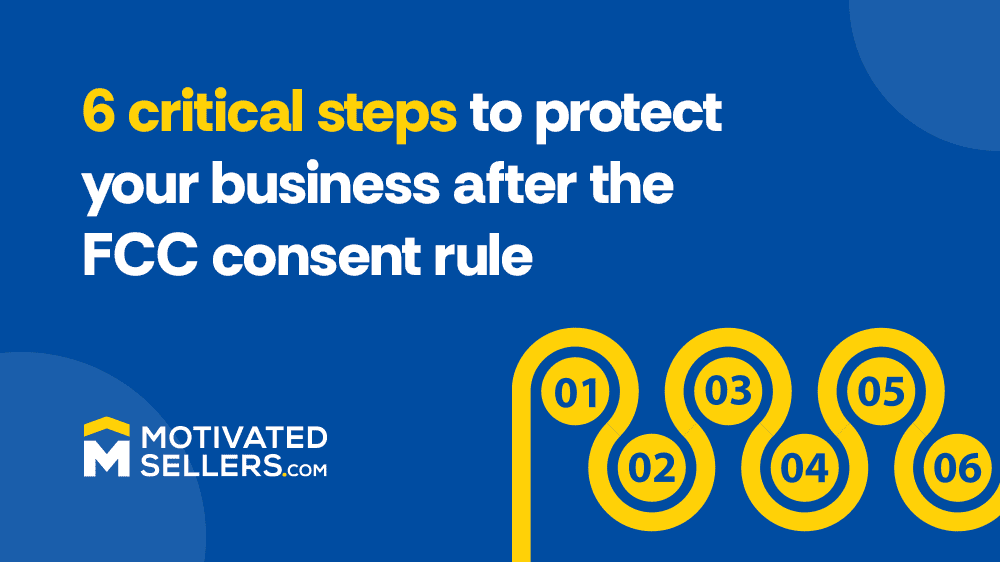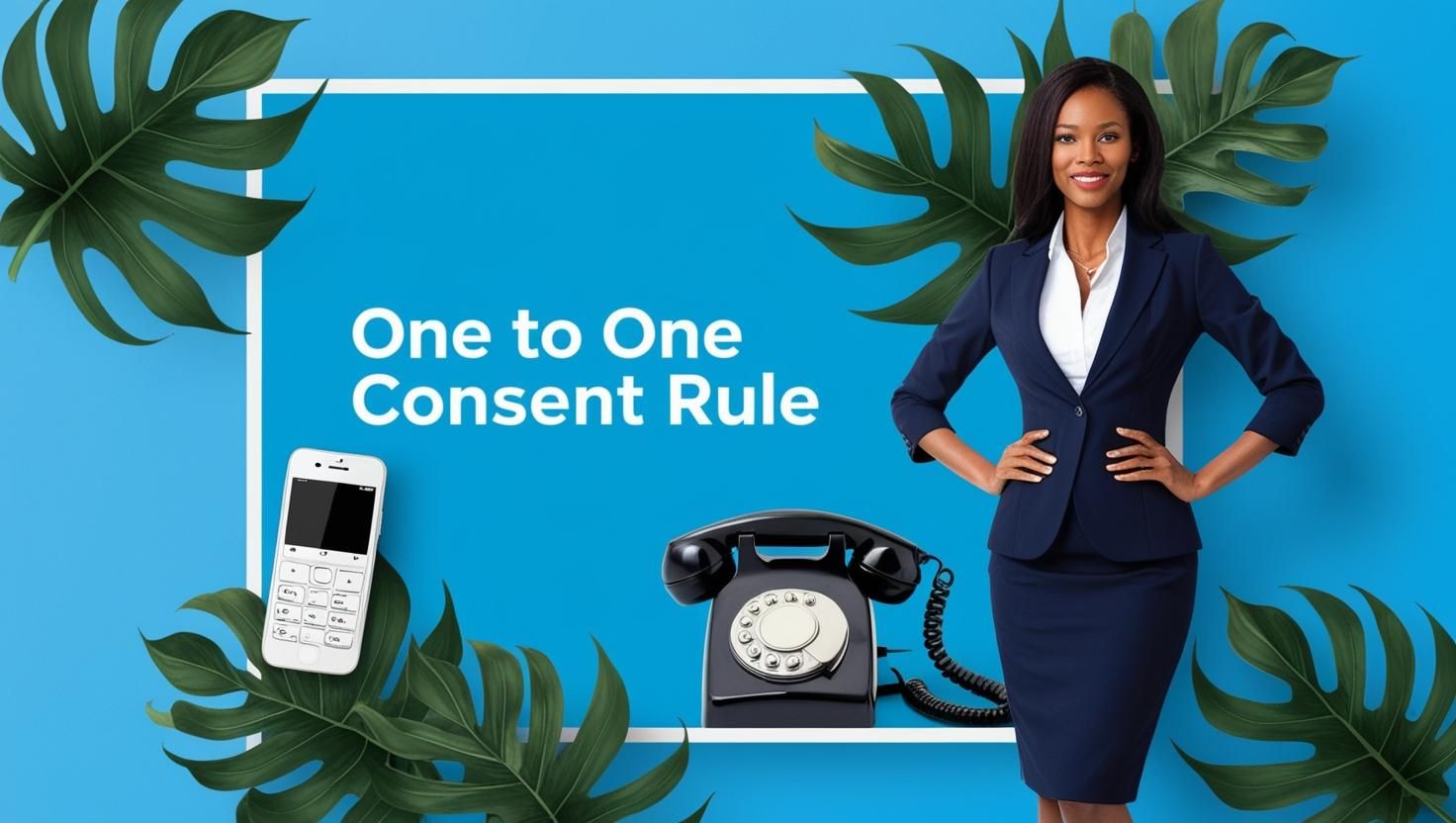

The FCC one-to-one consent rule, effective on January 27, has changed the marketing landscape for investors. While the one-to-one consent has introduced business challenges, it also presents an opportunity to build high-quality leads. This new regulation can position your business for long-term success. Today, we’ll talk about steps you must take to protect your business and continue to win more deals.
It’s an update to the TCPA (Telephone Consumer Protection Act) designed to cover a loophole in the previous laws. The update gives consumers better control over who can contact them. The rule clearly says that you must obtain explicit consent before you can contact a consumer via text, call, or automated communication methods.

Cold-calling and mass-texting have been popular marketing strategies for real estate investors. The one-to-one consent is now eliminating these strategies to a large extent. You cannot contact a seller unless you have obtained their explicit consent. That’s why it’s time to safeguard your business against TCPA penalties. Here are the top 6 actions you must take:
Written Consent Requirement: As an investor, you must get consent before you talk to a lead. The consent is required for all communication methods like marketing calls, text messages, and pre-recorded/automated (robocalls).
Clear and Transparent Disclosure: While collecting consent, make sure the language is clear and obvious to the consumer. Disclose:
No Pre-Checked Boxes: The consumer must opt in voluntarily while providing explicit and clear consent. You cannot imply consent through pre-checked boxes or unrelated or vague terms such as accessing a service or resource.
Record-Keeping: To avoid legal action, you must also maintain detailed records of consent, including:
The fine for violating TCPA rules is huge. It stands at $500 per violation and can be tripled if the court believes it’s willful conduct. High-volume callers could face financial damages amounting to thousands of dollars if they don’t understand the rules completely.
The FCC hasn’t mentioned a warning period for violating the consent rule. It’s important to take immediate action and protect your business.
Keep in Touch with Your Leads If You Have Explicit Consent: Do you have documented consent from a motivated seller who wants to work with you? If so, you can continue to send marketing messages or continue communication without any trouble.
Communication on Inbound Inquiries: It’s safe to communicate if someone calls you directly or fills out the form on your website. In the second scenario, make sure to have documented consent before initiating a call.
Opt-In Campaigns: You can continue to run marketing campaigns to attract more opt-ins. A classic example would be someone giving you their email address/phone number in exchange for a webinar or information-packed e-book.
Here are the 3 things you must avoid at all costs.
Calling/texting without consent: You cannot send bulk messages to homeowners who have not given their consent to hear from you. It is essential to implement a clear consent acquisition process to ensure all marketing communications comply with regulatory standards.
Outdated Lists: It’s not enough to assume consent because someone hasn’t opted out of your list. According to new rules, the consent must be explicit and clear.
Calling People on DNC Registry: The FCC requires you not to communicate with consumers who have registered on the “Do-Not-Call-Registry” unless you have their explicit permission.
Audit Your Consent Disclosures
Review all of your opt-in forms to stay compliant with the FCC's new rules. For compliance, the language on the opt-in page must be simple and clear. The name of the company/seller must be mentioned on the information capture page.
You cannot say, “You’ll receive a fair cash offer from one of our trusted investors.” You have to explicitly mention the company name. The consumer should know whether they will be contacted by one company or five different sellers.
In the case of multiple sellers, you must:
Collect Permission Again
Have you bought leads before? Maybe you bought a list of prospective clients and were randomly sending cold messages. You cannot continue on this path any longer. It’s wiser to request consent from your list again. You should do that even if you didn’t buy the list, but it’s outdated. To be safe, it’s crucial to record the subscriber’s consent that they will hear from you. Keep the record safe for five years.
If you’re buying leads from third-party resources, verify that the consumer gave consent to be contacted by your company or brand.
Alternative Marketing Strategies
Businesses should pivot toward sustainable, customer-focused marketing strategies like inbound marketing. You can leverage content marketing (blogs, videos, and social media) which is a compliant and scalable way to attract and engage motivated sellers. Direct mail is also a compliant marketing strategy.
Educate, Inform, and Train Your Team
As a real estate investor, you partner with others to generate and sustain leads for your business. It’s important that everyone in your team is familiar with TCPA’s consent policies.
Motivated Sellers is fully compliant with the FCC’s new one-to-one rule. We collect consent on behalf of the investors. So you can acquire motivated seller leads with peace of mind and continue to focus on your business.
Just make sure to fill out your display name and display company on our platform. That’s the name shown to potential sellers when they fill out a form requesting a cash offer. As long as the name represents your company, you’re in safe hands, and you don’t have to worry about the FCC’s compliance issues. As always, it’s important to stay updated about the industry because the TCPA regulations are complex and subject to change.
Cold-calling refers to the act of calling someone without establishing a prior relationship. After this rule, if you call a prospective consumer, you already have the permission. That means it’s easier to develop a business relationship.
So while the FCC consent rule will result in fewer leads for each business, the quality of those leads will be better. You’ll be working with consumers who are actually interested in your services, and your conversion rate will go up. This is the time to embrace a transparent, compliant approach to lead generation that prioritizes trust and accountability. By aligning your strategies with the FCC consent rule, you position your business for sustainable growth while minimizing legal and reputational risks.
How to Contact Consumers on the DNC Registry?
If somebody is on the DNC list, you need their explicit permission to contact them, or there must be an existing business relationship.
For legal purposes, the relationship lasts for 90 days after a customer inquiry or 18 months after a customer buys something from your brand.
What Kind of Penalties Could I Face for Non-Compliance?
TCPA has enforced this rule on all telecommunication marketing efforts, including regulated technology (auto-dialed, artificial, or pre-recorded calls and messages). The fine for a violation in this category is $500 per violation, according to TCPA regulations 227(b).
There is another category called the DNCR registry. It’s a list of consumers who do not wish to be contacted by marketing companies. The fine for a violation in this category is up to $500 (TCPA regulations 227(c)).
How Can I Verify Consent for Contacts I Already Have?
Communicate the updated FCC consent rules to your existing contact database and request explicit re-subscription where necessary. Ensure all responses are documented to meet new regulatory requirements.
Does this rule Impact 3rd party lead services?
Yes! You must verify that 3rd party lead services have received and provided explicit consent. At Motivated Sellers, we take care of this step so you can communicate with the motivated seller without any issue.